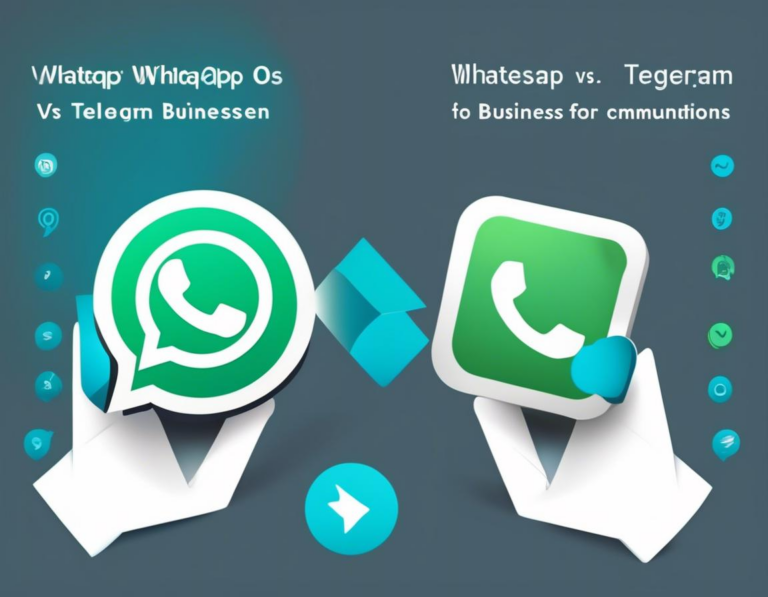Comparing WhatsApp vs Telegram for Business Communication

In today’s digital landscape, effective communication is paramount for businesses of all sizes. Choosing the right messaging platform can make all the difference in streamlining workflows, engaging customers, and fostering collaboration. Two popular contenders in the business communication arena are WhatsApp and Telegram. While both platforms offer robust messaging features, their strengths and weaknesses differ, making it crucial to understand their nuances before making a decision.
This comprehensive comparison will delve into the key aspects of WhatsApp and Telegram for business use, exploring their features, benefits, and limitations to help you determine which platform best suits your needs.
1. User Base & Reach:
WhatsApp boasts a massive user base with over 2 billion active monthly users worldwide. This makes it an ideal platform for reaching a broad audience and connecting with customers across diverse geographical locations. However, WhatsApp’s popularity is primarily concentrated in emerging markets, with lower penetration in developed countries.
Telegram, while having a smaller user base compared to WhatsApp, enjoys significant growth and is gaining traction in developed nations. It’s particularly popular among tech-savvy users and boasts a strong presence in Europe and Asia.
Key takeaway: WhatsApp is the undisputed leader in terms of user base and global reach, while Telegram is gaining momentum in specific markets.
2. Privacy & Security:
WhatsApp uses end-to-end encryption for all messages, ensuring that only the sender and recipient can read them. However, the platform has faced scrutiny over its data privacy practices, particularly its sharing of user data with Facebook.
Telegram emphasizes privacy and security, employing end-to-end encryption for secret chats and offering self-destructing messages. It also has a robust reputation for its commitment to user privacy and transparency.
Key takeaway: Both platforms offer end-to-end encryption for secure communication. However, Telegram’s overall focus on privacy and its transparent approach may make it a more attractive option for businesses concerned about data security.
3. Features & Functionality:
WhatsApp offers a streamlined messaging experience, focusing on individual and group conversations. Its key features include voice and video calling, document sharing, and the ability to create broadcast lists for reaching multiple contacts.
Telegram goes beyond basic messaging, offering a plethora of advanced features. These include:
- Channels: One-to-many communication channels for broadcasting messages to large audiences.
- Groups: Larger groups with up to 200,000 members, facilitating community building and collaboration.
- Bots: Automated chatbots for automating tasks and providing customer service.
- File sharing: Extensive file sharing capabilities, including large files, documents, and multimedia content.
- Polls and Quizzes: Interactive features for engaging audiences and gathering feedback.
Key takeaway: While WhatsApp provides essential messaging features, Telegram stands out with its advanced functionalities, making it a more versatile option for businesses seeking to leverage diverse communication tools.
4. Business Solutions:
WhatsApp Business is a dedicated app designed specifically for small and medium-sized businesses. It offers features like business profiles, automated messages, and catalogue management.
Telegram doesn’t have a dedicated business app but provides several features that can be effectively utilized for business purposes. These include:
- Business bots: Automated bots for customer service, appointment scheduling, and order tracking.
- Channels: Creating branded channels for promoting products, sharing company updates, and engaging with customers.
- Groups: Organizing team communication, coordinating projects, and fostering collaboration among employees.
Key takeaway: WhatsApp Business offers targeted features for businesses, while Telegram’s flexibility allows for creative and innovative business solutions.
5. Integrations & API:
WhatsApp Business API allows businesses to integrate the platform with their existing systems and automate tasks like order confirmation, appointment reminders, and customer support.
Telegram’s API is highly versatile and allows for extensive customization and integration with external applications. Businesses can leverage this to develop custom bots, create advanced integrations, and build unique solutions tailored to their specific needs.
Key takeaway: Both platforms offer API capabilities, but Telegram’s API provides more flexibility and customization options for businesses seeking to create sophisticated integrations.
6. Cost & Pricing:
WhatsApp Business is free to use, making it an attractive option for businesses on a tight budget. However, businesses can opt for the WhatsApp Business API, which incurs costs based on usage.
Telegram remains free for both personal and business use. This makes it a cost-effective solution for businesses of all sizes.
Key takeaway: Telegram stands out with its completely free pricing model, while WhatsApp offers a free basic app with paid API options.
7. Marketing & Promotion:
WhatsApp allows for limited marketing and promotional activities, primarily through broadcast lists and group messages.
Telegram provides more robust marketing tools, including:
- Channels: Creating branded channels for promoting products, sharing content, and engaging audiences.
- Advertising: Telegram offers advertising opportunities for businesses to reach a wider audience.
- Bots: Creating automated bots for marketing campaigns, lead generation, and customer engagement.
Key takeaway: Telegram offers a wider range of marketing and promotional tools, giving businesses more flexibility to reach and engage their target audiences.
8. Customer Support:
WhatsApp Business offers basic customer support features, including automated responses and group messaging for addressing customer inquiries.
Telegram provides a more comprehensive customer support ecosystem, including:
- Bots: Creating automated bots for handling frequently asked questions, resolving issues, and providing support 24/7.
- Groups: Establishing support groups for connecting with customers, gathering feedback, and addressing concerns.
- Channels: Creating support channels for sharing announcements, providing updates, and addressing customer queries.
Key takeaway: Telegram’s advanced features make it a more robust platform for providing comprehensive customer support.
9. User Experience:
WhatsApp is known for its simple and intuitive user interface, making it easy for users to navigate and send messages.
Telegram offers a slightly more complex user interface, with a wider range of features and functionalities. While this may require a steeper learning curve for new users, it ultimately provides more flexibility and customization options.
Key takeaway: WhatsApp’s streamlined user experience is suitable for basic communication, while Telegram’s more feature-rich interface may be better suited for businesses requiring advanced functionalities.
10. Considerations for Choosing the Right Platform
Choosing between WhatsApp and Telegram for business communication depends on several factors, including:
- Target audience: Consider the demographics and preferences of your target audience. WhatsApp is more prevalent in emerging markets, while Telegram enjoys wider adoption in developed nations.
- Communication needs: Assess your business communication requirements. If you primarily need a simple messaging tool, WhatsApp may suffice. However, for businesses seeking advanced features, Telegram offers a more comprehensive solution.
- Budget: Telegram’s free pricing model makes it a cost-effective choice, while WhatsApp Business offers a free basic app with paid API options.
- Security and privacy: Businesses prioritizing data privacy and security may find Telegram’s strong focus on these areas more appealing.
- Marketing and promotion: Telegram provides a wider range of marketing tools, making it a better choice for businesses seeking to leverage these capabilities.
11. Conclusion:
Both WhatsApp and Telegram offer valuable business communication tools, each with its strengths and limitations. WhatsApp excels in user base and simplicity, while Telegram stands out with its advanced features, privacy focus, and cost-effectiveness.
Ultimately, the best platform for your business depends on your specific requirements and goals. Carefully consider your target audience, communication needs, budget, security preferences, and marketing objectives to make an informed decision.
By carefully evaluating the factors outlined above, businesses can choose the messaging platform that best aligns with their communication strategy, fostering effective collaboration, engaging customers, and driving success.

